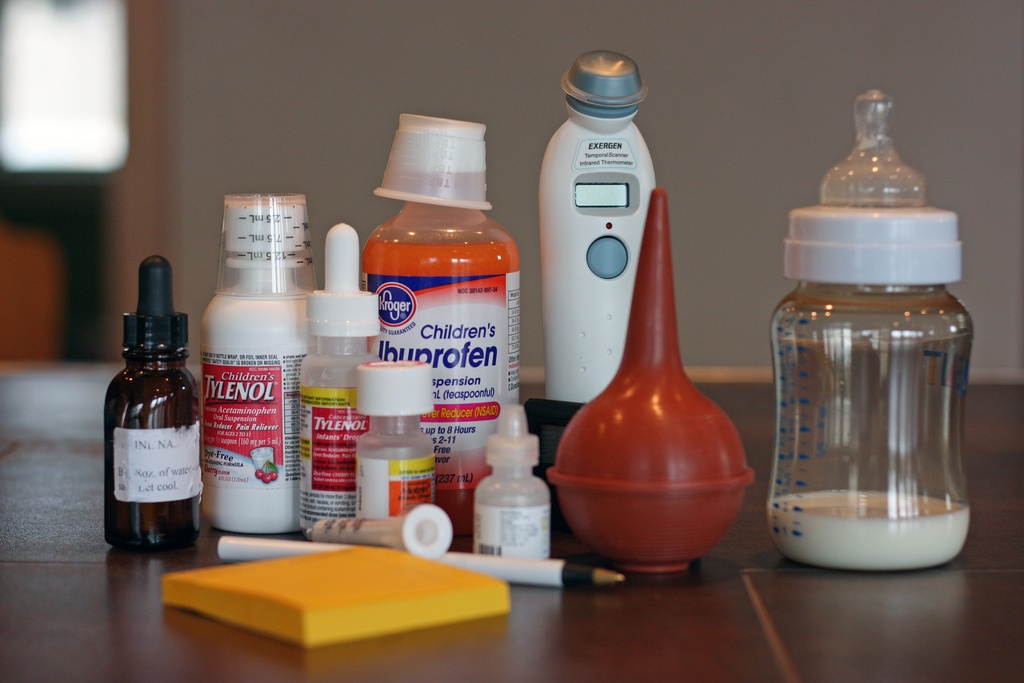When your child is in pain or has a fever, the first thing any parent wants to do is give them some relief. However, if not used correctly, Over-the-Counter (OTC) pain relievers and fever reducers, even those made “for children,” can be harmful. Here are some things to know about OTC medications to help you safely give your child relief when they need it (via Mayo Clinic, Babycenter, and the FDA).
Two primary types of OTC pain relievers and fever reducers
Acetaminophen
The active ingredient in Excedrin, Tylenol, Panadol, and many other prescription and non-prescription medications
Non-steroidal Anti-inflammatory Drugs (NSAIDs)
- Ibuprofen – the active ingredient in Advil, Motrin, and others
- Aspirin
- Naproxen Sodium - the active ingredient in Aleve, Midol, and others

How to use them
- Both Acetaminophen and NSAIDs provide relief for pain AND fevers, though NSAIDs also reduce inflammation and swelling.
- Studies suggest that ibuprofen may be more effective at reducing fevers and tends to last longer, but acetaminophen is safer to use overall.
- Use only products labeled for your child’s specific age group – do NOT give adult products to children! Additionally, use the measurement tool that came with the medicine (like a syringe or cap with the measurements printed on it) instead of using a teaspoon as children can easily overdose. Pay very close attention to dosing by weight.
When to use them
- Infants younger than 3 months should always be assessed by their doctor if they develop a fever of 100.4℉ rectally. Do not give them any medication until you get the green light from the doctor.
- Acetaminophen can be used safely in infants 3 months and older
- Ibuprofen can be used safely in infants 6 months and older
- Children under the age of 18 should NEVER be given Aspirin, especially if they have a viral illness, due to the risk of developing a rare condition called Reye’s Syndrome.
- OTC Naproxen can be used by children over the age of 12. If you’re curious about Naproxen in younger children, talk with your doctor first.
Check the label
- Before giving medication to a child, check the active ingredient to avoid accidental overdosing. For example, if you want to give an older child both pain medication and cold medication, be sure both medications don’t have the same active ingredient.
- Administer dosage and frequency for OTC medications exactly as instructed on the label. Do not modify dosages to give a younger child a product intended for older children or adults.
Cautions
- Cough and cold medications should not be given to children under 6 years of age. The risk of overdose is very high and no studies have shown that they are effective. There are several alternative options such as cool-air humidifiers and saline spray to provide relief for children during a nasty cold without needing medicine. Additionally, a piece of hard candy has been shown to help with a cough just as much as a cough drop. And a teaspoon of honey for our kiddos over 1 year of age has also proven to help with a cough.
- Avoid giving any of these medications if your child is dehydrated or actively vomiting – call your doctor instead.

Crane Humidifier, image via Project Nursery.
Side Effects
- As with any drug, side effects are present with varying severity and people react differently to each.
- NSAIDS are more likely to cause upset stomachs (particularly after prolonged use), but you can offset these side effects by only giving the recommended dose to your child and making sure they eat something small when taking medication.
- Acetaminophen side effects are minimal (rare but severe skin reactions), but giving too much can damage the liver– this is why it’s so important to be sure your child gets the correct dose!
- NSAIDs can make some conditions worse, so talk to your pediatrician if your child has kidney problems, a bleeding disorder, asthma, is on chemotherapy, or has ever had a stomach ulcer.
Always note the last time you gave your child medication in your Kinsa app so you can easily keep track of timing for the next dose.
This post was written by Michaela Hayes. Michaela is a public health nerd and WAHM to a 17 month old toddler. With a background in international health education and child development, Michaela has leveraged her perpetually wandering feet to promote positive sexual and family health across the globe. She lives with her husband and daughter in the Bay Area.







.png)
.png)
.png)